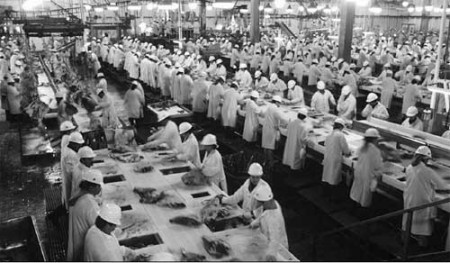The Greek word has the sense of “scandal” in the sense of something offensive. But it also has the very concrete meaning of something which causes others to trip and fall. A “stumbling block,” if you will. My housemates don’t necessarily feel hurt if I say I’m scandalized by them – Jesus was scandalous too (1 Cor 1:23) – and still is a stumbling block to many.
Food is a scandalous subject, laden with cultural assumptions. Any new vegan who has gone home at Christmas knows this. What, Grandma’s roast isn’t good enough for you? Whattayawant, anyway? It goes the other way, too – try asking for a burger in a vegan household. We are scandalized by one another’s choice in food.
In a great passage of 1 Corinthians 8, Paul talks about food choices. The choice, in those days, was whether to eat meat (slaughtered in pagan temples) or to be vegetarian (hence not touching idol-tainted meat). My anti-vegetarian friends love to quote this one because it says “those whose conscience is weak eat only vegetables.” Paul was NOT putting us vegetarians down, though. His point is that those who are fully convinced that there is no such thing as a god other than God will not be upset by eating pagan meat. Paul is in that category. He has no moral qualms about meat. However, he is VERY careful not to scandalize his friends.
Hence, as to the eating of food offered to idols, we know that “no idol in the world really exists,” and that “there is no God but one.”… It is not everyone, however, who has this knowledge. Since some have become so accustomed to idols until now, they still think of the food they eat as food offered to an idol; and their conscience, being weak, is defiled. “Food will not bring us close to God.” We are no worse off if we do not eat, and no better off if we do. But take care that this liberty of yours does not somehow become a stumbling block to the weak. For if others see you, who possess knowledge, eating in the temple of an idol, might they not, since their conscience is weak, be encouraged to the point of eating food sacrificed to idols? So by your knowledge those weak believers for whom Christ died are destroyed. But when you thus sin against members of your family, and wound their conscience when it is weak, you sin against Christ. Therefore, if food is a cause of their falling, I will never eat meat, so that I may not cause one of them to fall.
To me, another question comes up. What about the members of our family who are workers in meatpacking plants? Meatpacking is one of the most dangerous jobs around, due to the speed of the line and the risk of disease. Or what about the members of our family who pick pesticide-laden crops, day after day? Would they be scandalized if they saw us carelessly eating the cheap burgers and strawberries for which they labor? If they saw us preaching “we are all one in the family of God” on Sunday, and saying “$2/pint is way too much for strawberries” on Monday? If we sin against these brothers and sisters, we sin against Christ.
Next time you complain about the price of food, think about the brother or sister (for whom Christ also died) who grew, harvested, processed, or served you the food. If they food should be cheap - are they worthless too? What does your theology say? What does your budget say?









No comments:
Post a Comment